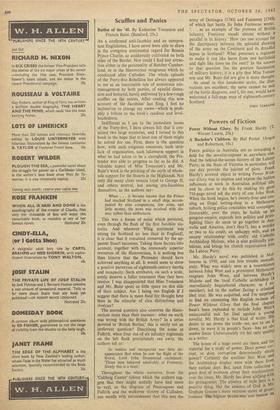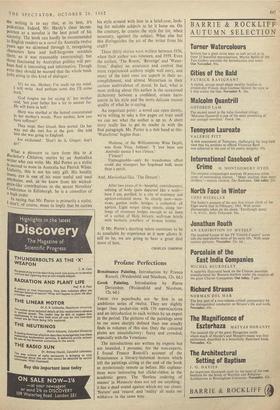Powers of Fiction
A Bachelor's Children. By Hal Porter. (Angus and Robertson, 18s.) PARTY politics in Australia are as rewarding a field for the novelist-exposer as anywhere else. And the behind-the-scenes history of the Labour Party, in the State of Victoria in particular, will one day provide the juiciest of plots. Frank Hardy's avowed object in writing Power With- out Glory was to explore and expose the hidden influences at work in Australian political life, and he chose to do this by making his giant 716-page novel tell the story of one John West. When the book begins, he's twenty-four and run- ning an illegal betting-shop in a Melbourne suburb, bribing police constables with sovereigns. Inexorably, over the years, he builds up his gangster-empire, expands into politics and prize- fighting (they do seem to go together in Aus- tralia and America, don't they?), has a murder or two to his credit, an unhappy wife, and an uneasy relationship with crafty old Catholic Archbishop Malone, who is also politically am- bitious, and brings his church organisation into the Labour Party. Mr. Hardy's novel was published in Mel- bourne in 1950, and ran into trouble immedi- ately. What was widely seen as a resemblance between John West and a prominent Melbourne magnate John Wren, and between Hardy's Malone and the local Catholic archbishop (a marvellously Inquisitorial character, as I re- member), led to the author facing a criminal libel trial. He was acquitted, and I'm surprised to find on examining this English re-issue of Power Without Glory that the final chapter
hasn't been expanded to include John West's unsuccessful suit for libel against a young
novelist. Mr. Hardy is that kind of writer. His desire to set down the truth—no, not to set it down, to wave it in people's faces—has an ob, sessive force. Unfortunately it's his only quality as a writer.
The bones of a huge novel are there, and the material for a study of power. Does power cor-
rupt, or does corruption determinedly attain
power? Certainly the qualities that West and the Archbishop display were with them from their earliest days. But, apart from collecting a
great deal of evidence about their machinations over the years, Mr. Hardy has done nothing With his protagonists. The absence of style here is a positive thing, like the absence of God in Mr. Graham Greene's more extreme states of grace- lessness. The highest praise one can bestow on- the writing is to say that, at its best, it's pedestrian. Indeed, Mr. Hardy's sheer incom- petence as a novelist is the best proof of his sincerity. The book can hardly be recommended to English readers as a novel (in Australia twelve years ago we skimmed through it, recognising characters here and half-forgotten scandals there, so it was reasonably entertaining), but those fascinated by Australian politics will per- haps find it interesting and informative. Though e. yen they should be warned that the whole book jerks along in this kind of dialogue: 'It's no use, Mother; I've made up my mind. I will write. And perhaps some day I'll come back.'
`God forgive me for saying it,' her mother said, 'but your father has a lot to answer for. He will burn in hell.'
Mary was startled at the hatred concentrated in her mother's words. 'Poor mother, how you have suffered!'
They wept, they kissed, then parted. On her way out she met Joe at the gate. She told him she was going to England.
Joe exclaimed : 'Don't do it, Ginger; don't go!'
What a pleasure to turn from this to A Bachelor's Children, stories by an Australian writer who can write. Mr. Hal Porter as a stylist is second to none in Australia but Patrick White. Unfairly, this is not his only gift. His beadily ironic eye is one of his most useful and used attributes, and, as we know from his wicked- Pixie-like contributions to the recent Novelists'
Conference in Edinburgh, he is a comedian of a high order.
In saying that Mr. Porter is primarily a stylist, I don't, of course, mean to imply that he carries his style around with him in a brief-case, look- ing for suitable subjects to Iet it loose on. On the contrary, he creates the style for (or, when necessary, against) the subject. What else but this distinguishes the art of the writer from his craft?
These thirty stories were written between 1936, when their author was nineteen, and 1959. Even the earliest, 'The Room,' Revenge' and 'Water- front,' display an assurance and control that more experienced authors might well envy, and many of the later ones are superb in their ac- complishment, and almost Mozartian in their curious ambivalence of mood. In fact, what is most striking about this author is the occasional dichotomy between a confident, ornate baro- querie in his style and the more delicate rococo quality of what he is saying.
An important point: a novel can open slowly; we're willing to take a few pages on trust until we can see what the author is up to. A short story really has to get its reader in with the first paragraph. Mr. Porter is a dab hand at this. 'Waterfront' begins thus: Madame, of the Williamstown Wine Depot, was from Vraa, Jutland: 'I 'ave been een Australie seence I was t'irteen.'
T'irteen?
Unimaginable—only by transhuman effort could she transport her hogshead bulk more than a perch.
And, Marienbad-like, 'The Dream':
After two years of it—hospital, convalescence, refining of body (pain departed like a soul)— here I am, purified, in a city of rosemary and apricot-coloured stone. So clearly seen—man- sions, garden walls, bridges, a cathedral, all apricot. Light surges along streets, along fur- longs of rosemary hedges enough to air linen of a surfeit of Holy Infants; wall-tops bristle with barbaric jewellery of broken bottles.
If Mr. Porter's dazzling talent continues to be as assailable by experience as it now allows it- self to be, we are going to hear a great deal more of him.
CHARLES OSBORNE















































 Previous page
Previous page